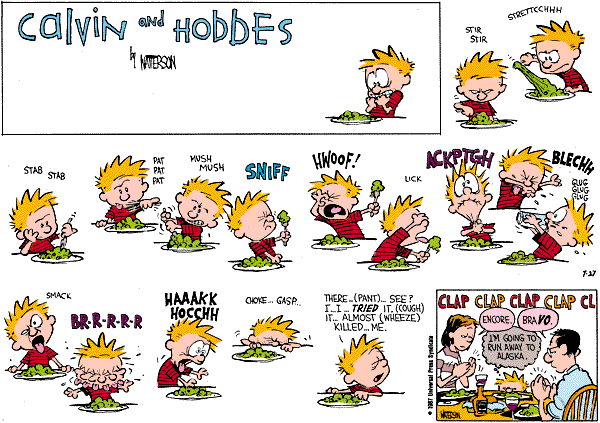 |
| Source |
I am the least picky eater you'll meet. I am not prejudiced against any foods. Yes, some I prefer more than others, and I'm not exactly the biggest fan of liquorice, but if you give it to me, I'll eat it. Yet, unfortunately, I'm one of the few in the world like this. I know so many people who refuse to touch anchovies or mushrooms or tomatoes.
So I pondered upon this. See, food is not only a physical source of nutrition and toxins, but it is also as a source of pleasure and a mediating tool in social relations. Reasons behind our food likes and dislikes are therefore quite interesting.
 |
| Source |
We do have some innate and genetic predispositions that influence our food preferences. From an adaptive perspective, we have innate biases for basic tastes. For instance, we like sweet things. All sensible people go crazy for sugar-loaded calorific bombs. If health wasn't an issue, we'd all be eating sugar like there was no tomorrow. High sugar content signifies high calories, and back when we were still living in caves, we needed that. Conversely, the innate dislike for bitter tastes is a result of its presence in toxic foods, and similarly, our natural aversion for sour tastes is because they often indicate that fruits are unripe or spoiled. So it's understandable if you don't like your bitter greens. This has all been supported by impressively clever psychological studies showing that these basic taste biases are prominent in human newborns. Other than that, it's also been shown that genetics may give certain people predisposed taste biases. The detection of phenelthiocarbamide and 6-n-propylthiouracil, both bitter-tasting compounds, appears to be an inherited trait. Depending on the alleles and stuff you get, you will either find these two compounds tasteless, or painfully bitter.
I know what you're thinking. Well, I know what you should be thinking. Babies may not like sour cherries, but the preferences for sweet, sour and bitter are drastically different across individuals later in life, and if genetics were such an important factor, then I'd be like my father and detest bananas. That guy really does detest bananas. Just the smell of it is nauseating to him. One of the worst scoldings I had ever received as a child was when I had thrown banana peel into his office bin. "The whole office smells of bananas, Maria!"
But anyway, while there are definitely similarities in food preferences within members of a family, rather than it being attributable to genetics, clever people have found that the shared environment is a far more important factor in accounting for the similarities. And you know what, at the end of the day, taste is only one of the components of food. Textures and smells also influence our liking of foods. I like arancini not just because of the taste, but oh the textures. The thin crispy outer layer, the soft creamy rice right afterwards, then a piece of melted stringy cheese in the middle. I love contrasting textures in a dish.
So innate predispositions for foods... On its own it's not enough to explain why my friend refuses to eat anything remotely related to seafood. Most food preferences are acquired in childhood -- many eating habits in childhood are predictive of those later in life. One of the first ways in which humans learn to like foods is through mere exposure. I'm grateful for my parents for many reasons -- they provide a roof over my head, education, clothes and everything else, but also, they were very good in just feeding me everything as a child. I was exposed to a wide range of foods, to everything. All fruits and veg, and all meats and fish. Repeated exposure can also alter food preferences, actually. I remember I disliked peppers, but my mother loved it and so it was always on the dinner table, and I had always tried a little bit of it each time, and over time, roasted peppers became one of my favorite things.
Now, think peer pressure -- what do you see? "Dude, smoke a cigarette, all the cool kids are doing it" ? Wouldn't the world be a better place if that was instead, "Are you wasting your spinach? Dude, what's up with that?" While that may not happen as much, it's true that if we see our friends eat a certain thing, we're more inclined to eat it. There was an interesting study set in a school cafeteria where children were offered a choice of two vegetables. The targeted children were placed next to a child who preferred a different vegetable, and after four consecutive days their preferred vegetable switched to that of their peer. Furthermore, a follow-up study showed that the preference persisted after several weeks. So if you don't know what to do with your child's aversion of apples, make him befriend some apple-lovers.
 |
| Source |
The role of our parents in determining our food preferences is interesting. Oddly enough, not only is there little resemblance in parents’ and children’s food preferences overall, but also mothers, who usually have more contact with children in the food domain, do not have more similar food preferences with their children than the fathers. Other than external influences, this could also be due to the fact that mothers do not always feed their children the same foods they themselves consume. This is especially true of dieting mothers who give their children more of the unhealthy equivalents of the foods they eat.
There are of course many more reasons - bad food experiences, parents being too restrictive etc etc. So, I guess at the end of the day, we can't really blame those that dislike mushrooms, but we should be more openminded about the foods we dislike. You may just like it if it's cooked in a different way.












This felt like a bit of your psych essay but also really interesting things. REALLY INTERESTING THINGS. :D Awesome! xoxox
ReplyDeleteHey, great blog, but I don’t understand how to add your site in my reader. Can you Help me please?
ReplyDeleteMicrodosing shrooms